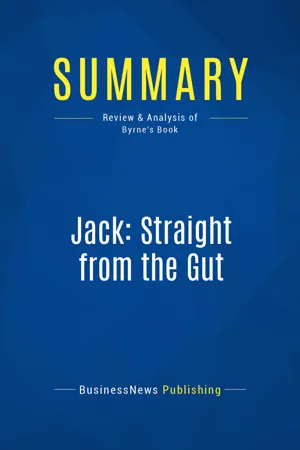![]()
Summary of Jack: Straight From The Gut (Jack Welch with John Byrne)
The Early Years
Jack Welch was born on November 19, 1935 in Peabody, Massachusetts. Both his parents were second-generation Americans of Irish descent. His father worked all his life as a railroad conductor on the Boston & Maine commuter line between Boston and Newburyport, leaving his mother to carry the balance of the upbringing of Jack, their only child.
After graduating from the Salem High School, Jack applied to go to the nearest state university, the University of Massachusetts at Amherst, because “tuition was only fifty bucks a semester. That meant I could get a degree for less than $1,000, including room and board”. He began college in the fall of 1953 and by the time he graduated in 1957 with a degree in chemical engineering, Jack was one of the university’s two best engineering students. He decided to enroll in the Ph. D. program at the University of Illinois at Champaign because they offered him a fellowship. By the time he left Illinois in 1960, not only did he have a Ph.D. but he had also met and married his first wife, Carolyn Osburn.
As a 24-year old graduate, Jack Welch had several offers of work, but one that particularly interested him was an offer from Dr. Dan Fox who was setting up a development group to work on new plastics for General Electric in Pittsfield, Massachusetts. They were working on a new thermoplastic called PPO (polyphenylene oxide) which looked very promising. Jack was hired to oversee the process of getting the new plastic out of the lab and into production. So, Jack started at GE on October 17, 1960 as an engineer making $10,500 per year.
Within a year, Jack had become frustrated by the bureaucracy at GE and decided to quit. He even handed in his notice and had accepted another position when a young GE executive met with him and persuaded Jack to stay at the company. He offered more money, an increase in responsibility and cover from some of the more obscure bureaucratic demands. Jack decided to stay on and see how it worked out.
By the time GE decided to commit $10 million to building a pilot plant for the manufacture of PPO in 1964, Jack Welch lobbied to be appointed general manager of the plant to replace a more experienced manager who was promoted to a strategic planning position at corporate headquarters. Before Jack had a chance to celebrate, however, a minor problem arose – it was found that PPO had a serious flaw. The material cracked when exposed to high temperatures which meant its proposed use as a replacement for hot water pipes was out of the question. To remedy the problem would take six months of intensive work in the lab, but ultimately it was found blending polystyrene and rubber into the PPO improved its performance characteristics. (PPO would later become a winning product which is now marketed as Noryl. Today, Noryl generates over $1 billion per year in sales for GE).
With the success of the PPO project behind him, Jack Welch was promoted in June 1968 to become general manager of GE’s $23 million plastics business.
“This was a big deal, making me at 32, the company’s youngest general manager. The move put me into the big leagues with all the trimmings – an annual invitation to the company’s top management meeting every January in Florida and my first stock options. I was on my way.”
– Jack Welch
Naturally, the 32-year old Jack Welch had a number of rough edges. As well as being proud and unwilling to acknowledge the solid work of predecessors, Jack had little tolerance for protocol. He encouraged open and vigorous debate, earning him a reputation as a corporate maverick.
“I was blunt and candid and, some thought, rude. My language could be coarse and impolitic. I didn’t like sitting and listening to canned presentations or reading reports, preferring one-on-one conversations where I expected managers to know their business and have the answers. I loved ‘constructive conflict’ and thought open and honest debate about business issues brought out the best decisions. If an idea couldn’t survive a no-holds-barred discussion, the marketplace would kill it. Larry Bossidy, a good friend and former GE vice chairman, would later liken our staff meetings to Miller Lite commercials. They were loud, raucous and animated.”
– Jack Welch
Jack was also openly ambitious, writing in his 1973 performance review that his long-term career objective was to become the CEO of General Electric. Fortunately, this did not seem to hurt his career, and in June 1973 Jack Welch was appointed group executive for GE’s chemical and metallurgical division, a $2 billion in annual sales unit with 46,000 employees and 44 factories in 8 countries. Suddenly, this brash 36-year old was on everyone’s radar screen at GE.
With the promotion, Jack was expected to move to GE’s corporate headquarters in Fairfield, New York. That idea did not appeal, however, and he was able to convince the vice chairman of the company to allow him to work with a 5-person staff from a suite of offices in the Berkshire Hotel in Pittsfield instead. Jack made loads of mistakes running the group, but gradually started developing a feel for how the GE system worked.
With his next promotion to sector executive in 1977, Jack was forced to move to corporate headquarters. This suited him, however, because it was now widely known Reg Jones, the CE...
